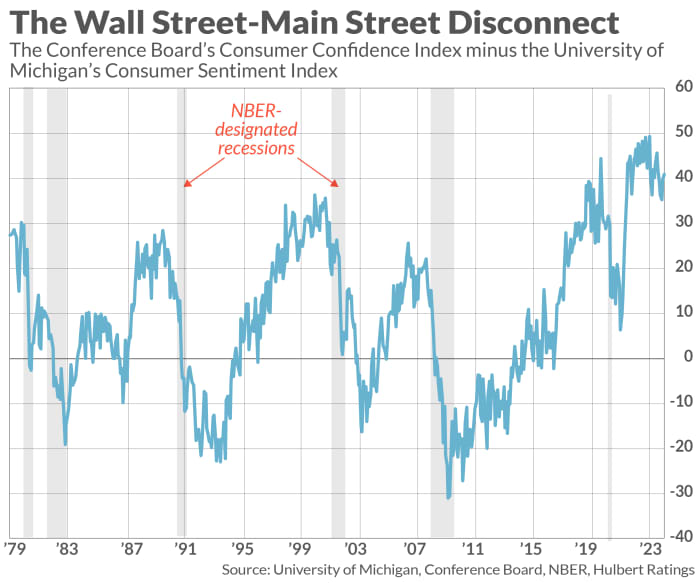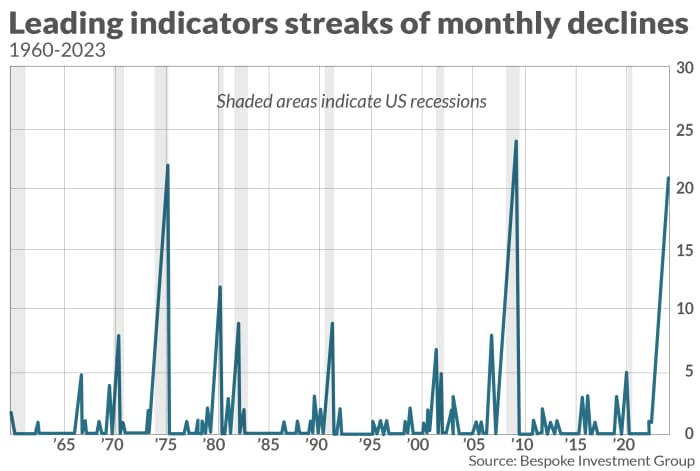Wall Street and Main Street: Divergent Views on the Recession
January 25, 2024 | by stockcoin.net


Wall Street and Main Street: Divergent Views on the Recession
The article “Wall Street and Main Street: Divergent Views on the Recession” highlights the growing disparity between the perspectives of Wall Street and Main Street on the state of the economy. While Wall Street is celebrating the stock market’s new records and believes that the Federal Reserve has successfully avoided a recession, the average American holds a more pessimistic view. Many individuals report significant slowdowns in their industries and widespread fears in their communities about the future. This disconnect is exemplified by the difference between the Consumer Confidence Index (CCI) and the Consumer Sentiment Index (UMI), which remains historically high. While it is possible that the U.S. will avoid a recession, caution is warranted, as past instances of such disparities have been followed by economic downturns. This article emphasizes the importance of considering both Wall Street and Main Street perspectives when assessing the health of the economy.
The Wall Street – Main Street Disconnect
Different perspectives on the health of the U.S. economy
There is a significant divide between Wall Street and Main Street when it comes to assessing the health of the U.S. economy. While Wall Street is celebrating record highs in the stock market and believing that the Federal Reserve has successfully achieved a “soft landing” to avoid a recession, the average American is much more pessimistic. Many individuals have reported significant and sudden slowdowns in their particular industries, as well as widespread fears in their communities about the future. This divergence in perspectives is a cause for concern and may indicate potential trouble ahead.
Consumer Confidence vs. Consumer Sentiment
Difference between the Conference Board’s Consumer Confidence Index (CCI) and the University of Michigan’s Consumer Sentiment Index (UMI)
One way to measure this disconnect is by comparing the Conference Board’s Consumer Confidence Index (CCI) and the University of Michigan’s Consumer Sentiment Index (UMI). The CCI focuses more on consumers’ attitudes towards the overall economy and is strongly correlated with the stock market and news headlines. In contrast, the UMI is more heavily influenced by consumers’ immediate personal circumstances. The chart above shows the historical spread between these two indices, with the current spread remaining higher than ever historically. This suggests that there is a significant gap in perception between the general state of the economy and individuals’ personal experiences.
Historical Data and Recessions
Previous occurrences of a recession after the spread between CCI and UMI started to retreat from a new high
Historical data reveals that a recession has often followed periods when the spread between the CCI and UMI began to retreat from a new high. While it is not guaranteed that a recession will occur this time around, it is essential to remember the famous investing adage: “it’s different this time.” This phrase can be dangerous because it can lead to complacency and overlooking warning signs. In the past, market crashes and recessions have occurred despite assurances that the current situation is unique. Therefore, caution and skepticism are crucial when evaluating the current economic landscape.
The Danger of Assuming ‘It’s Different This Time’
The four most dangerous words in investing
Comparison to previous market crashes and recessions
The phrase “it’s different this time” has proven to be the most dangerous in the world of investing. Many investors have been lured into complacency by believing that current market conditions are unique and that the usual warning signs of a downturn can be ignored. However, history has shown that this mindset can have severe consequences. For example, in 2007, just two months before the start of the worst recession since the 1930s, the then-president of the Federal Reserve Board of San Francisco, Janet Yellen, claimed that the economy was on a “glide path for the proverbial soft landing.” This misplaced confidence highlights the importance of remaining cautious and wary of assuming that current conditions are fundamentally different from those in the past.
The Index of Leading Economic Indicators (LEI)
21 months of consecutive declines in the LEI
Historical data showing the correlation between LEI declines and recessions
Another indicator of potential economic trouble is the Index of Leading Economic Indicators (LEI). The LEI measures a variety of economic factors and has experienced 21 months of consecutive declines, making it the third-longest streak on record. Historical data shows that previous streaks of similar magnitude have been followed by recessions. This correlation between LEI declines and recessions highlights the importance of paying attention to economic indicators and their potential impact on the overall economy.
Wall Street Celebration vs. Main Street Concerns
The stock market’s record highs vs. individual and community fears
The impact of consumer sentiment on the stock market
While Wall Street celebrates record highs in the stock market, individuals and communities are expressing concerns and fears about the future. This disconnect between the stock market and Main Street is significant because it indicates a lack of synchronization between financial markets and the real economy. The stock market’s success does not necessarily translate to the well-being of everyday Americans. Consumer sentiment plays a crucial role in driving the stock market, as consumer spending represents a significant portion of the economy. If consumer sentiment remains low due to individual and community fears, this could have long-term implications for the stock market’s performance.
Experts’ Perspectives on the Recession
James Stack’s grim outlook on the economy
The need for caution and skepticism
James Stack, editor of the InvesTech Research newsletter, provides a grim outlook on the economy, warning of a potential “disastrous train wreck.” Stack tracks the spread between the CCI and the UMI and believes that the current situation is reminiscent of previous market crashes and recessions. His perspective serves as a stark reminder of the dangers of complacency and overconfidence. Experts like Stack emphasize the need for caution, skepticism, and continuous monitoring of economic indicators to make informed investment decisions.
Recession Predictions and Probability
The likelihood of a recession based on historical indicators
Evidence supporting the possibility of an impending recession
Based on historical indicators, there is a significant likelihood of a recession occurring in the near future. The previous occurrences of recessions following a retreat from a new high in the spread between the CCI and UMI suggest that there may be an impending downturn. Additionally, the prolonged decline in the LEI and its correlation with previous recessions provide further evidence supporting this possibility. It is important to closely monitor these indicators and be prepared for potential economic challenges.
The Importance of Addressing Main Street Concerns
The negative impact of a disconnect between Wall Street and Main Street
The need for a more balanced and inclusive economic approach
The disconnect between Wall Street and Main Street has negative implications for the broader economy. When the stock market is booming while individuals and communities are facing significant economic challenges, it leads to a sense of inequality and discontent. This social unrest can have wide-ranging consequences and affect overall economic stability. To address these concerns and promote a more balanced and inclusive economy, policymakers and businesses need to recognize the importance of addressing the needs and fears of everyday Americans.
Conclusions and Implications for the Economy
The potential consequences of a recession
The importance of monitoring economic indicators and consumer sentiment
The potential consequences of a recession are significant and can have far-reaching effects. Economic downturns can lead to job losses, business closures, and financial hardship for individuals and communities. To mitigate these effects, it is crucial to monitor economic indicators and consumer sentiment closely. By staying informed and aware of potential warning signs, investors and policymakers can make more informed decisions and take proactive measures to minimize the impact of a recession. Additionally, addressing the concerns and fears of Main Street is essential for promoting economic stability and social cohesion. A more balanced and inclusive approach to the economy can help bridge the gap between Wall Street and Main Street and foster a healthier and more resilient economic landscape.

RELATED POSTS
View all






